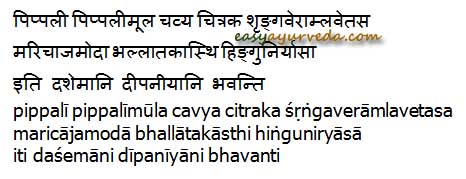Deepaneeya Gana Herbs Of Charaka: Review, Benefits, Formulations
By Dr MS Krishnamurthy MD (Ayu), PhD.
The words ‘Deepaneeya’ means that which stimulate the digestive fire. This is very essential to increase the capacity of the food intake and to prevent from the further indigestion. Also classical literatures of ayurveda emphasize that the root cause for all the diseases is indigestion.
It is the reason after the Pachana (digestive) of the Ama (undigested food) it is very essential to administer the medicaments or food which are having the carminative (Deepaneeya) effect.
It is the reason in most of the classical formulations one or other carminative herbs are included so as to facilitate the drug action and to further enhance the therapeutic effects of the drugs.
Classical reference: Charaka sutra 4/9

Table of Contents
Deepaneeya Gana
1. Pippali – Long pepper fruit – Piper longum-Fruit
Carminative, digestive, liver stimulant, appetizer, anti spasmodic etc.
2. Pippalimoola – Long pepper – Piper longum-Root
Anti spasmodic, analgesic, stimulant, carminative, appetizer etc.
3. Chavya (Piper chaba Hunter.)-Stem
Stimulant, carminaticve , digestive, appetizer, liver stimulant, anti spasmodic, scraping, diaphoretic, anti pyretic etc.
4. Chitraka – Leadword – Plumbago zeylanica-Root
Appetizer, stimulant, carminative, anti histaminic, abortificient, stimulant of the uterus etc.
5. Shringavera – Ginger – Zingiber officinale–Rhizome
Carminative, digestive, expectorant, stimulant, bronchodilator etc.
6. Amlavetasa – Garcinia pedunculata Roxb. / Rheum emodi Wall.-Fruit
Cardiac tonic, appetizer, anti spasmodic, stimulant etc.
It is an excellent cardiac stimulant, digestive and laxative. Used in Ayurved since the time of Charaka, it is also useful in cough, bloating, splenomegaly etc.
7. Maricha – Black pepper fruit – Piper nigrum-Seeds
Broncho- dilator, adaptogenic, stimulant, appetizer, digestive, carminative,anti gungal, immune-modulator, anti histaminic etc.
Black pepper has not got its well deserving credit. It certainly is not just another spice. It removes toxins conditions, heals, stimulates organs. It is also used as antidote in insect bites. It is one among the three ingredients of very important Ayurvedic medicine – Trikatu.
8. Ajamoda– Celery fruit – Trachyspermum roxburghianum-Seeds
Antispasmodic , appetizer, carminative, anti flatulent, digestive etc.
9. Bhallataka (Semecarpus anacardium Linn.)-Seeds
Stimulant, immune modulator, cytotoxic, carminative, digestice, anti bacterial,anti fungal, rubificient, bone tissue strengthener etc.
10. Hingu Niryasa – Asa foetida nathex–Resin
Analgesic, neuro- stimulant , digestive, carminative, anti spasmodic etc.
Qualities
Qualities in general and actions of Deepaneeya gana drugs:
The drugs which are carminative in action are dry(ruksha), hot(ushna) and light(laghu) in quality and hot in potency. Usually such drugs undergo pungent or sour kind of metabolic transformation (Katu/ amla vipaka).
Therapeutic uses
Therapeutic uses of Deepaneeya gana drugs:
These drugs individually or in multiple combinations act as lipolytic (helps to bring down the lipid level), scraping(take away the excess fat), analgesic, anti spasmodic, liver stimulant etc. In women it acts as stimulant of the uterues in smaller dosage and as abortificient in larger dose.
Due to the above said properties it is useful in gaseous tumors (gulma),abdominal colic (shoola),indigestion (agnimandya), distension of the abdomen (adhmana), gurgling (atopa), dysmenorrhoea (kricchrartava),Kamala (obstructive jaundice) etc.
Ayurvedic formulations
Formulations containing Deepaneeya drugs :
Hingwastaka choorna,
Vaishwanara choorna,
Hingwachadi choorna,
Hingwadi gulika,
Vachalashunadi kashaya,
Pippalyasava, Chavikarishtha,
Chitrakadi vati etc are the few formulations containing these ingredients in various proportions and combinations.
Disadvantages
Disadvantages of Dipaniya gana drugs:
As the ingredients of this group are hot, spicy, stimulant and penetrative it is always better to avoid the combinations of the above drugs in pregnancy, puerperal period, constipation, hemorrhoids, bleeding disorders, ulcers, patients with the history of repeated abortion, mouth ulcers etc. Bhallaka is a rubificient, stimulant and corrosive and hence while using any of the combination containing this drug should take sufficient precautionary measures.
Simple formulations that can be made from the above drugs and their application in routine practice:
The drugs like Pippali, Pippalimoola, Ajamoda are taken individually or in combination and soaked in lemon juice and ginger juice. This is kept in sunshine and dried. The procedure can be repeated for 3-5 times. The powder hence obtained can be used in the conditions like abdominal pain, indigestion, maldigestion, abdominal distension etc.
The hot infusion of these drugs is also equally beneficial in such conditions.
Formulation development opportunities:
Potent liver stimulants, carminative syrups , digestive tablets or capsules etc can be prepared out of these drugs. In animal care also good proprietary formulations can be made which will stand as safe and effective formulations to treat the common complaints like abdominal colic, indigestion, lethargy etc of the pets.
Click to consult Dr MS Krishnamurthy MD (Ayu), PhD.









5 comments
Marcin
Hi, can you recommend any book, or a source, which has the names of herbs in Sanskrit in devanagari for someone who cannot read devanagari?
Dr J V Hebbar MD(Ayu)Author
Currently I have not found any such book.
We will come up with such a book shortly.
Jyoti
Resp sir,
Sorry for the typo. The correct question is:
Why neem, guduchi, haritaki, jeeraka, musta, kutaja have NOT been mentioned in deepaniya gana category (although these have some digestive potential) ?
regards
Dr J V Hebbar MD(Ayu)Author
Though they have digestion potential, only the best 10 are selected by Charaka.
Dr J V Hebbar MD(Ayu)Author
because these are mild and are not as potent as – for example trikatu to do both Deepana and Pachana.